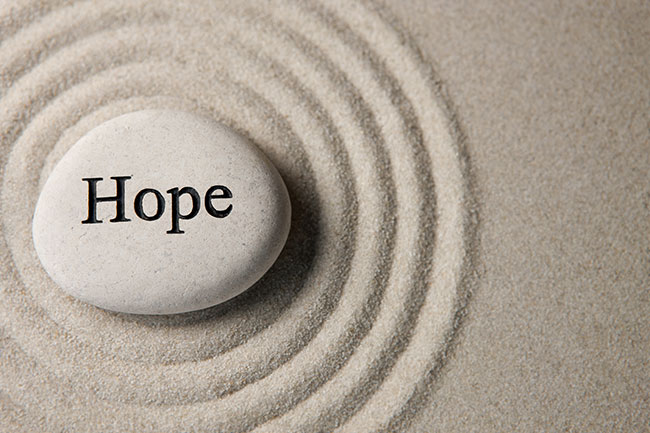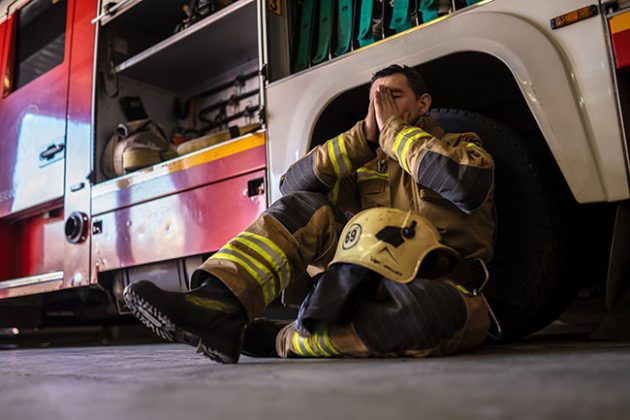
Features
Health and wellness
Trainer’s Corner: Caring for compassion fatigue
August 31, 2020
By
Ed Brouwer
 PHOTO: Olga Lyubkin/Adobe Stock
PHOTO: Olga Lyubkin/Adobe Stock Author’s note: This is simply to provide information! It is NOT to be used to diagnose or to be used as a cure of any kind! If you or someone you know is thought to be suffering from PTSD seek professional help immediately.
You’ve just left the hall. Your shift has finally ended and you’re on your way home. You’re presently stopped for a red light. You close your eyes for a moment as “Paint it Black” by the Rolling Stones plays on the radio. Just then you hear the loud blare of a horn. Half in a daze you lift your foot off of the brake and begin to roll through the intersection only to realize the light is still red. “What?” Once again, the driver behind you blows his horn: Beep! Beep! You look up, but the light hasn’t changed. You look in the mirror and say, “Idiot, it’s a red light.” Beep, beep, beep! You give a glare that could stop a charging rhino and mutter, “Are you out of your freak’n mind? One more time buddy! Just one more.” Beep, beep! “You gotta be kidding me! Really? Really?” Beep, beep!
You slam the selector into park as you jump out of your car and storm towards the driver behind you—who happens to be grinning like a fool. You reach in through the window, grab the guy by the shirt, pull him halfway out and yell, “What do you want?!” The now fearful driver stutters, “Your…your…your bumper sticker says, honk if you love firefighters!” Stunned you look at your bumper and realize you are standing in the middle of the street, holding up traffic with the light now green. You smile sheepishly as you notice for the first time the three wide eyed seniors in the back seat. It isn’t until you are back in your vehicle that you realize you have something in your hands. Funny, you think, it looks a lot like a clerical collar.
Reactions like those described above are not normal, you do know that — right? Joking aside, we are going to take a look at what is being labelled ‘the silent killer’, and that is Post Traumatic Stress Disorder (PTSD). I realize that there have been numerous articles written on this subject, but given the current state of affairs in our country I urge you to take a few minutes and review this all important subject.
PTSD is one of several anxiety disorders that affect one in 10 people, making it the most common category of mental health problem, reports the Canadian Mental Health Association. In amongst PTSD is the complex issue of compassion fatigue, and that is the main subject before us today. Compassion is defined as a feeling of deep sympathy and sorrow for another who is stricken by misfortune, accompanied by a strong desire to alleviate the suffering.
The famed theologian Albert Schweitzer said: “… but this I do know, you who will be truly happy are those who will have sought for and found a way to serve.” First responders are all about serving but the COVID-19 pandemic is taking a huge physical, mental and emotional toll. Limited PPE, long work hours, social distancing, isolation and a real and constant concern for family and loved ones is causing overwork, exhaustion and in some cases, compassion fatigue.
Compassion fatigue is medical: the physical and mental exhaustion and emotional withdrawal experienced by those who care for sick or traumatized people over an extended period of time.
Tim Jarvis, renowned scientist and survivalists, said that “unlike burnout, which is caused by everyday work stresses (dealing with insurance companies, making treatment choices), compassion fatigue results from taking on the emotional burden of a patient’s agony.”
Some researchers consider compassion fatigue to be similar to PTSD, except that it applies to those emotionally affected by the trauma of another (eg, client or family member) rather than by one’s own trauma, as reported by Michael K. Kearney et al. in The Journal of the American Medical Association, March 2009.
Compassion fatigue is a type of burnout. It can come on suddenly with little warning, and has been known to reload past traumas, compounding the problem.
There are common symptoms, such as re-living an event through memories, nightmares or flashbacks, avoidance and emotional numbing, increased alertness and aggression or insomnia, headaches, and profound sadness. It can also lead to drug or alcohol addiction, depression or other illnesses.
Throughout my career I have stood strong in my faith. It has been the rock-solid foundation beneath my at time quivering legs. One of my life statements is, “What man is a man who does not make the world he lives in better.” For years this statement provided guideposts and gave me a sense of purpose. But to be honest, as of late it’s become a bit of a burden.
Have you ever felt like your circle of concern is bigger than your circle of influence? Does it seem that no matter what you do to make things better, nothing ever changes? If you do, you’re not alone.
And yet, one word we heard a lot in the beginning of this pandemic was that this is going to be different. “Isn’t it funny how day by day nothing changes, but when you look back, everything is different?” said the author C. S. Lewis.
There is a scripture verse that states we should always be ready to give a reason for the hope seen in us. Certainly, my hope is in God, but sometimes, because I wear my emotions on my sleeve, I don’t come across as compassionate let alone hopeful. I’m concerned for you, my fellow trainers, and not just in regard to the infection and the economic spinoffs that will hit our families. However, I must understand and be okay with the fact that I have little if any control over your situations.

PHOTO: Sergey/Adobe Stock
Recently a friend of mine asked, “How are you Ed?” Rather than my usual “I’m okay,” I replied, “I’m hopeful.” He looked at me sideways and asked, “What are you hopeful for?” I said, “Not sure, just hopeful.”
I think of the first responder’s role as being bringers of hope. We can’t guarantee a perfect outcome, but we can bring hope. I have witnessed — as I’m sure you have — that strange thing that happens within patients/victims when we pull up on scene. Even the crowds of onlookers seem to let out a sigh of relief.
May we never lose that gift. Fight to keep hope alive. I realize it seems that no matter what we sacrifice nothing seems to change. One pandemic leads into another. COVID-19 is not the first, nor will it be the last. However, we can be hopeful.
As a training officer it’s important to remember you are dealing with people who tend to have a ‘rescue mindset’. That is, they (we) are the helpers, not the ones who need help.
One of my councillors (yes, I did reach out) asked me what I did for “Ed”. After several answers he said, “It sounds like you are doing it for “Ed” but really all those things are driven by your desire to help others.”
The lights suddenly came on and I realized I was preoccupied with the needs of others. And dare I say I’m not alone. Please, if you have even a hint of trouble, get help early.
There are a few things you can do before a critical incident. Having an exercise program, following a good diet, and hydrating with water can make a huge difference. Hydrating flushes chemicals from the adrenaline rush out of your body. You can also release them by exercising. Avoid alcohol, sugar, and caffeine.
Building relationships with loved ones is your strongest defense. You don’t need to share all the details of an incident but share how you felt or feel now. Find someone you trust and talk to them about the incident and vent.
The big thing for you and your members to know is they’re not alone. Provide contact info for your department’s critical incident stress management teams, fire chaplains, or other support programs your department has in place.
And please remember your members’ families. A firefighter’s spouse must cope with the constant stress, sacrifice, and frustration of sharing a life with someone who is always walking into danger.
Think about it from the fireground angle. The “we are the rescuers” mindset can and does keep us from calling a “mayday” that would save our physical body, and it keeps us from asking for critical incident stress management that could save us from mental destruction.
Strange how we see deploying the rapid intervention team as rescuing our own and hide from the critical incident response team.
The greatest resource in the Canadian fire service is the firefighter, and although every firefighter is provided with turnout gear, we give them little to protect them from the ravages of emotional trauma.
We must equip them to deal with death, crisis, and suicide. Firefighters must be given opportunity to talk about the pressures involved in traumatic situations, to understand what others have experienced in similar situations, and know that they are not alone in their feelings.
We must not overlook compassion fatigue as secondary trauma. Every effort must be made to save not only the lives of firefighters, but their emotional health as well.
And now a note, trainer to trainer: If you find yourself experiencing symptoms of PTSD, don’t ignore it! Seek help early. Yes, your work is important. You are caring for people who are caring for people during a pandemic. But you cannot help them help others if you do not first help yourself.
I will give you a heads up. Recovery is usually a matter of two steps forward and one back, but you will make progress. Each one of us deals with compassion fatigue (secondary trauma) in our own way and on our own time schedule. Gradually work back into your routine. And please, let others carry more weight for a while at home and at work. Be kind to yourself.
Make self-care a priority. Do your best to practice healthy habits. Cultivate your faith. Reach out over the phone or through a text message to supportive loved ones, friends, and colleagues. Recognize and accept what you cannot change. And if your department provides you with formal mental health support, use it!
Recurring thoughts, dreams or flashbacks are normal and they usually decrease over time. Communicate with your loved ones at home as frequently as possible. Remember that getting back to “normal” takes time. Some of you were never “normal” to begin with. Sorry, I had to put that in there! That brings up another good point: appreciate a sense of humor in yourself and others. It’s okay to laugh again.
Be assured that there is a road out of this terrible place. Please talk to someone about what you are feeling. You do not have to go it alone.
Ed Brouwer is the chief instructor for Canwest Fire in Osoyoos, B.C., deputy chief training officer for Greenwood Fire and Rescue, a fire warden, wildland urban interface fire-suppression instructor and ordained disaster-response chaplain. Contact Ed at aka-opa@hotmail.com.
Print this page
Advertisement
- Study explores wildfire smoke health effects
- First Line: Partnerships — The value of working together